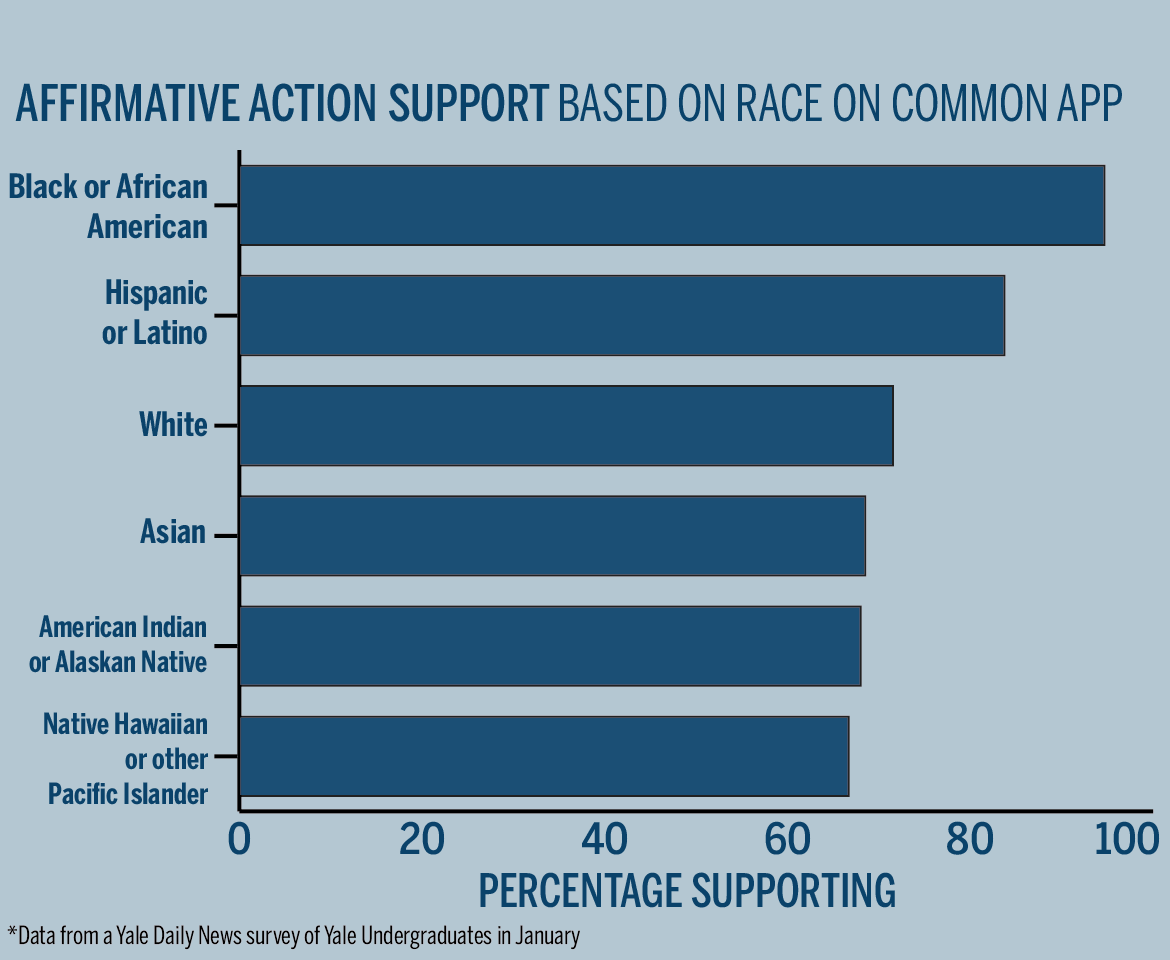
Designed by Chris West
According to a News survey distributed last month, more than two-thirds of undergraduate respondents said they supported affirmative action.
The survey had 1,486 respondents, with 74.06 percent of them responding “Yes” when asked if they were in favor of affirmative action. Affirmative action was defined as the “set of procedures designed to eliminate unlawful discrimination among applicants, remedy the results of such prior discrimination, and prevent such discrimination in the future,” as written on the website of the Legal Information Institute, which is housed at Cornell Law School. A 2016 Gallup Poll found that 7 in 10 Americans thought that “merit” — rather than other qualities like ethnicity or religion — should be the “only basis” for admission into college.
“Despite their many differences, all Yale students have a shared experience with the undergraduate admissions process, so I am not at all surprised that our students have a variety of opinions on these topics,” said Dean of Undergraduate Admissions and Financial Aid Jeremiah Quinlan. “I hope that, in addition to sharing their thoughts through this survey, our students will discuss these issues through constructive dialogue with other members of the Yale community.”
The survey comes as the Department of Justice continues its investigation into Yale’s alleged discriminatory admissions practices, which allegedly unfairly hurt Asian-American students in the admissions process. Harvard has also faced a lawsuit on similar grounds, and the decision on Harvard’s trial is still forthcoming. The Harvard lawsuit is seen as a proxy battle testing the constitutionality of affirmative action.
Despite the fact that Asian Americans are sharply divided on the issue throughout the country, 68.02 percent of survey respondents who identified as either East Asian, South Asian or Southeast Asian said that they supported affirmative action.
When told that the majority of survey’s respondents, including those who identify as Asian, were in favor of affirmative action, Edward Blum, president of Students for Fair Admissions — the group that sued Harvard — said that the term “affirmative action” was too “fuzzy” to be asked about.
“It means one thing to some and a different thing to others,” Blum wrote in an email to the News.
The News survey asked respondents the following question: “Are you in favor of Affirmative Action, as it stands currently, in the United States?” But Blum said that questions more relevant to the Harvard and Yale investigations are: “How should race or ethnicity factor into admissions decisions? Should be a major factor? Should be a minor factor? Should not be a factor at all?”
The 2016 Gallup poll asked Americans a similar question. Sixty-three percent of those polled by Gallup said that “race or ethnicity” should “not … factor at all” in college admissions decisions. The Gallup poll did not ask respondents directly about their thoughts on affirmative action.
Blum also pointed to a recent survey conducted by WGBH — a Boston public radio station — in conjunction with ABT Associates, just a few days before the Harvard trial began last September. That survey asked respondents: “The Supreme Court has decided colleges can use race as one factor in deciding which applicants to admit. Do you agree or disagree with this ruling?” Twenty-four percent of respondents said they agreed while 72 percent disagreed.
“If the percentages of Yale students remain the same when asked these questions, I would be greatly surprised,” Blum wrote in an email to the News.
Still, in a Pew Research Center survey from 2014 that directly asked respondents if they thought “affirmative action programs designed to increase the number of black and minority students on college campuses” were “a good thing or a bad thing,” 63 percent of respondents surveyed in support of the policy.
Neither the head coordinators, nor the civic and political engagement officers of Yale’s Asian American Cultural Center responded to multiple requests to comment. The center’s dean, Joliana Yee, also did not respond to request to comment.
However, in October, Yee sent out an email addressed to the “Asian and Asian American community at Yale” explaining her disagreement with the Harvard lawsuit, calling it a “threat … [to] the future of higher education.”
“I’m hopeful that as [students] grapple with affirmative action and details of the case come to light, you will come to see how a race-conscious, whole-person approach to admissions is necessary to strengthening our communities of learning and a step in the right direction for improving access, equity and inclusion in higher education,” the email read.
The AACC was established in 1981.
Skakel McCooey | skakel.mccooey@yale.edu







